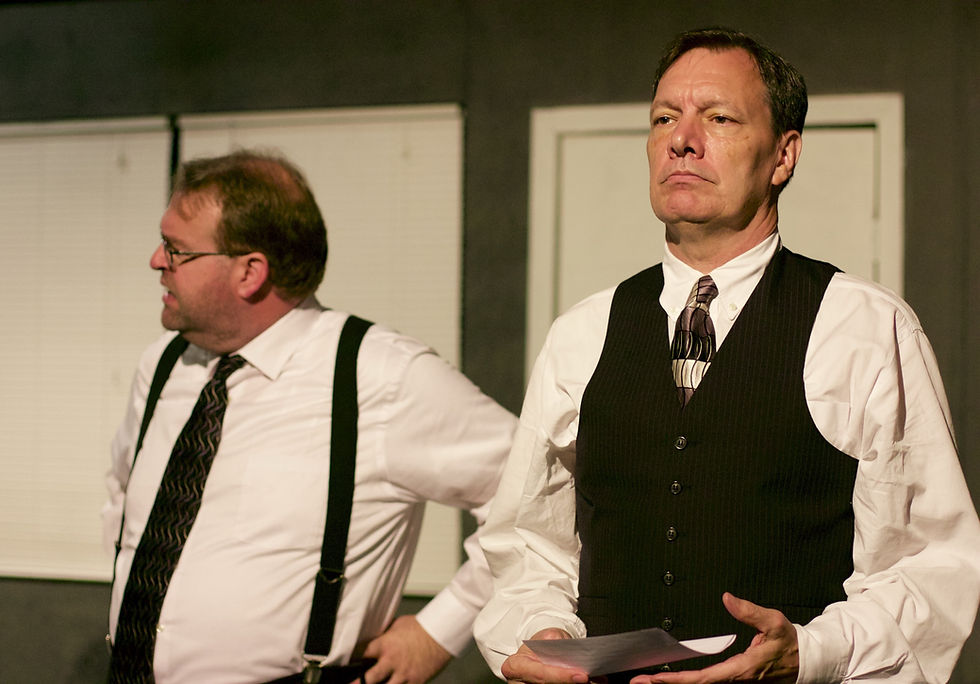RACE - A Look Inside: Charles Strickland
- Carolyn Choe
- Jun 13, 2017
- 3 min read

"He was born into wealth and, according to the other characters, never had to listen to the word 'No.' Now, he has been accused of rape. The victim is a young, African American woman. According to Strickland at the beginning of the play, they were in a consensual relationship. However, as the drama continues, Strickland begins to unravel as shameful moments from his past come to light. For example, a college roommate (a black male) drudges up an old postcard written by Strickland, in which he uses racial slurs and profanity to describe the weather in Bermuda. Strickland is stunned when the lawyers explain that the "humorous" message is racist. Throughout the play, Strickland wants to make a public apology to the press, not to confess to a rape, but to admit that there may have been a misunderstanding." ThoughCo.Com "Race" by David Mamet, A Play About Skin, Sex, and Scandal"
Actor Bob Smith plays Charles in Out of Box's production of Race. We asked him a few questions about the play and his role.
OOB: What initially drew you to Race?
The fact that it was Mamet, initially. Then, after reading the script, and seeing how much it challenges perceptions about race, I wanted it badly. I knew it wouldn't be easy to do or even to watch, because it makes you look hard at your own prejudices, no matter what kind of person you are.
OOB:What intrigues you about Mamet’s work in general?
His characters are rich, his dialog is clever. I feel like it's a baptism that any good actor should go through. No matter how "good" a person is in a Mamet play, they'll have a dark, selfish side. I like exploring that.
OOB: What or who has inspired your portrayal of Charles?
I like discovering the dichotomy that is Charles. His arc from disdainful spoiled rich man to his humbling is rich. His realization that his relationship with black people, including everyone from his college roommate to his girlfriend are not what he thought they were, and letting him crumble as he finally understands that has been heartbreaking and fantastic.
OOB: What has the rehearsal process been like?
It's been wonderfully challenging. Take a normal play, add the rapid-fire, staccato delivery of lines, while simultaneously attempting to be present and honest and react to others is very difficult, which is part of why I've enjoyed it so much.Subtle changes in line delivery carry so much weight in this play.
OOB: Do you think audiences in 2017 will be receptive to a play that deals with the subject of race so bluntly?
Absolutely. We've changed some standards and made some progress, but the minds and hearts of people are very difficult to change. I think audiences will discover a lot about themselves in the process of watching it, and in discussing it on the way home. This play will stick in the viewers brain for a couple of days at least. That's one sign of a good play.
OOB: What kind of challenges has this show presented for you?
I knew I'd have to dig deep to get Charles. I tend to play more amiable characters, and whether you think Charles is guilty or not, he's not a terribly warm or genial person. It's a challenge for me to keep his uptight, selfish nature, but still allow humanity into him, in spite of his flaws, but do it in a plausible way.
OOB: Would you take on this role again, if you had the opportunity?
I'm ecstatic I got the role, and love what I got to learn and explore with it. I wouldn't "re-do" it, but knowing what I now know, I'd definitely take the role again.
.png)




















Comments